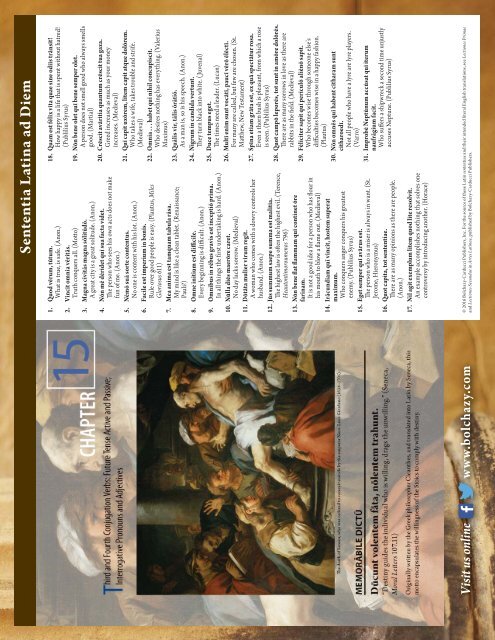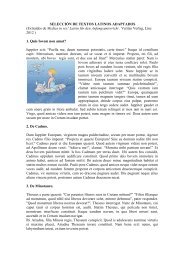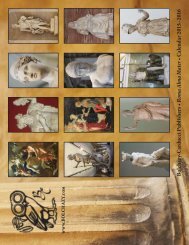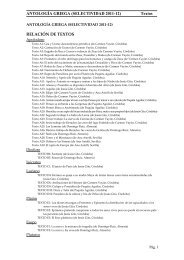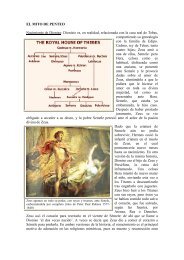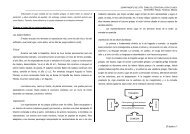www.BOLCHAZY.com
2016-2017RomanCalendar
2016-2017RomanCalendar
Create successful ePaper yourself
Turn your PDF publications into a flip-book with our unique Google optimized e-Paper software.
Visit us online<br />
<strong>www</strong>.bolchazy.<strong>com</strong><br />
Sententia Latina ad Diem<br />
1. Quod vērum, tūtum.<br />
What is true, is safe. (Anon.)<br />
2. Vincit omnia vēritās.<br />
Truth conquers all. (Motto)<br />
3. Magna cīvitās magna sōlitūdō.<br />
A great city is a great solitude. (Anon.)<br />
4. Nōn mē dērīdet quī sua facta videt.<br />
The person who sees his own acts does not make<br />
fun of me. (Anon.)<br />
5. Nēmō suā sorte contentus.<br />
No one is content with his lot. (Anon.)<br />
6. Facile est imperium in bonīs.<br />
Rule over good people is easy. (Plautus, Miles<br />
Gloriosus 611)<br />
7. Mea anima est tamquam tabula rāsa.<br />
My mind is like a clean tablet. (Renaissance;<br />
Pauli?)<br />
8. Omne initium est difficile.<br />
Every beginning is difficult. (Anon.)<br />
9. Omnibus in rēbus gravis est inceptiō prīma.<br />
In all things the first undertaking is hard. (Anon.)<br />
10. Nūlla diēs maerōre caret.<br />
No day lacks sorrow. (Medieval)<br />
11. Dōtāta mulier virum regit.<br />
A woman who <strong>com</strong>es with a dowry controls her<br />
husband. (Anon.)<br />
12. Jūs summum saepe summa est malitia.<br />
The highest law is often the highest evil. (Terence,<br />
Heautontimoroumenos 796)<br />
13. Nōn bene flat flammam quī continet ōre<br />
farīnam.<br />
It is not a good idea for a person who has flour in<br />
his mouth to blow a flame out. (Medieval)<br />
14. Irācundiam quī vincit, hostem superat<br />
maximum.<br />
Who conquers anger conquers his greatest<br />
enemy. (Publilius Syrus)<br />
15. Eget semper quī avārus est.<br />
The person who is a miser is always in want. (St.<br />
Jerome, Hieronymus)<br />
16. Quot capita, tot sententiae.<br />
There are as many opinions as there are people.<br />
(Anon.)<br />
17. Nīl agit exemplum lītem quod līte resolvit.<br />
An example ac<strong>com</strong>plishes nothing that solves one<br />
controversy by introducing another. (Horace)<br />
18. Quam est fēlīx vīta quae sine odiīs trānsit!<br />
How happy is a life that is spent without hatred!<br />
(Publilius Syrus)<br />
19. Nōn bene olet quī bene semper olet.<br />
A person does not smell good who always smells<br />
good. (Martial)<br />
20. Crēscit avāritia quantum crēscit tua gaza.<br />
Greed increases as much as your money<br />
increases. (Medieval)<br />
21. Quī capit uxōrem, lītem capit atque dolōrem.<br />
Who takes a wife, takes trouble and strife.<br />
(Medieval)<br />
22. Omnia . . . habet quī nihil concupīscit.<br />
Who desires nothing has everything. (Valerius<br />
Maximus)<br />
23. Quālis vir, tālis ōrātiō.<br />
As a man is, so is his speech. (Anon.)<br />
24. Nigrum in candida vertunt.<br />
They turn black into white. (Juvenal)<br />
25. Duce tempus eget.<br />
The times need a leader. (Lucan)<br />
26. Multī enim sunt vocātī, paucī vērō ēlēctī.<br />
For many are called, but few are chosen. (St.<br />
Matthew, New Testament)<br />
27. Spīna etiam grāta est, ex quā spectātur rosa.<br />
Even a thorn bush is pleasant, from which a rose<br />
is seen. (Publilius Syrus)<br />
28. Quot campō leporēs, tot sunt in amōre dolōrēs.<br />
There are as many sorrows in love as there are<br />
rabbits in the field. (Medieval)<br />
29. Fēlīciter sapit quī perīculō aliēnō sapit.<br />
Who be<strong>com</strong>es wise through someone else’s<br />
difficulties be<strong>com</strong>es wise in a happy fashion.<br />
(Plautus)<br />
30. Nōn omnēs quī habent citharam sunt<br />
citharoedī.<br />
Not all people who have a lyre are lyre players.<br />
(Varro)<br />
31. Improbē Neptūnum accūsat quī iterum<br />
naufrāgium facit.<br />
Who suffers a shipwreck a second time unjustly<br />
accuses Neptune. (Publilius Syrus)<br />
© 2016 Bolchazy-Carducci Publishers, Inc. For the source of these Latin sententiae and their intended literal English translations, see Lectiones Primae<br />
and Lectiones Secundae in Artes Latinae, published by Bolchazy-Carducci Publishers.


